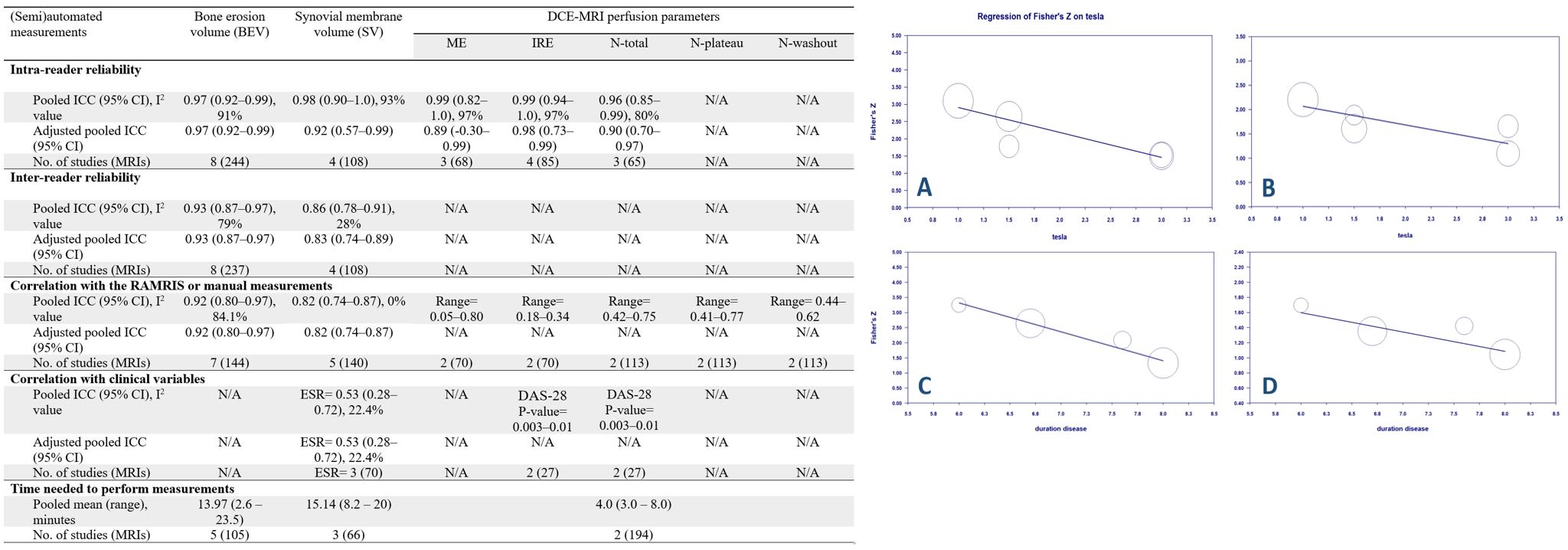Session Information
Session Type: Poster Session D
Session Time: 9:00AM-11:00AM
Background/Purpose: To summarize the feasibility, reliability, and validity of computer-aided quantification of joint destruction and synovitis on MRI using artificial intelligence (AI) based methods in patients with inflammatory arthritis.
Methods: A systematic literature search was performed on PubMed, EMBASE, SCOPUS, and Cochrane databases for original articles published from January 01, 1985 to June 02, 2020. We selected studies in which patients with inflammatory arthritis were enrolled, and arthritis-related structural damage/synovitis in peripheral joints were assessed on non-CE, CE, or DCE-MRI using (semi)automated methods. Data were pooled using random-effects model. Publication bias was addressed using the Begg and Mazumdar test and the trim and fill method. Subgroup analysis and meta-regression were performed.
Results: 28 studies consisting of 1342 MRIs were included (age=54.8; 66.7%female; duration of arthritis=3.6years). Pooled analysis showed an overall excellent intra- and inter-reader reliability for computer-aided quantification of bone erosion volume (BEV) (r=0.97(95%CI:0.92–0.99) and 0.93(0.87–0.97)), synovial membrane volume (SV) (r=0.98(0.90–0.99) and 0.86(0.78–0.91)), and DCE-MRI perfusion parameters (r=0.99(0.82–1) for maximum enhancement, r=0.99(0.94–1) for initial rate enhancement, r=0.96(0.85–0.99) for and total number of enhancing voxels (N-total)). Meta-regression analysis showed that computer-aided and manual methods provide comparable reliability for quantification of bone erosion, synovitis, and perfusion parameters (P>0.05). Computer-aided measurement of BEV (r=0.92), SV (r=0.82), and DCE-MRI biomarkers (r=0.72 N-total; r=0.74 N-plateau; r=0.64 N-washout) were significantly correlated with the OMERACT RAMRIS scores (P< 0.01). Among clinical and laboratory factors, SV was moderately correlated with ESR level (r=0.52, P< 0.01). On average, (semi)automated analysis of BEV/SV and DCE-MRI takes 17mins (vs. 9mins for OMERACT RAMRIS method) and 4mins (vs. 33mins for manual reading), respectively.
Conclusion: AI-based methods demonstrate feasibility, reliability and validity when utilized to quantify MRI pathologies of peripheral joints in patients with inflammatory arthritis; this provides a sound basis for future research. Computer-aided evaluation of inflammatory arthritis on non-CE and CE-MRI, and DCE-MRI could be considered as an alternative to conventional observer-based methods.
 PRISMA flowchart diagram for study selection and risk of bias assessment using the QUADAS-2 tool. No concern was detected regarding the applicability of patient selection, index test, and reference standard.
PRISMA flowchart diagram for study selection and risk of bias assessment using the QUADAS-2 tool. No concern was detected regarding the applicability of patient selection, index test, and reference standard.
 General characteristics of included studies in the meta-analysis and details of the search strategy, using the keywords and the number of retrieved entries from PubMed.
General characteristics of included studies in the meta-analysis and details of the search strategy, using the keywords and the number of retrieved entries from PubMed.
 Results of pooled analysis and meta-regression: Pooled ICC values for intra- and inter-reader realibility of each computer-aided measurement, correlation values between computer-aided measurements and manual scores/ clinical findings, and time needed to perform each image analysis method (Table). Meta-regression analysis for the association between the field-strength of MR scanner (tesla of MRI) and intra-reader (Fig A) and inter-reader (Fig B) reliability of computer-aided measurement of bone erosion volume (BEV) on MRI. Meta-regression analysis for the association between the duration of disease, form the onset of inflammatory arthritis (years), and intra-reader (Fig C) and inter-reader (Fig D) reliability of computer-aided measurement of synovial membrane volume (SV) on MRI.
Results of pooled analysis and meta-regression: Pooled ICC values for intra- and inter-reader realibility of each computer-aided measurement, correlation values between computer-aided measurements and manual scores/ clinical findings, and time needed to perform each image analysis method (Table). Meta-regression analysis for the association between the field-strength of MR scanner (tesla of MRI) and intra-reader (Fig A) and inter-reader (Fig B) reliability of computer-aided measurement of bone erosion volume (BEV) on MRI. Meta-regression analysis for the association between the duration of disease, form the onset of inflammatory arthritis (years), and intra-reader (Fig C) and inter-reader (Fig D) reliability of computer-aided measurement of synovial membrane volume (SV) on MRI.
To cite this abstract in AMA style:
Haj-Mirzaian A, Kubassova O, Boesen M, Bird P, Carrino J. Role of Artificial Intelligence in Assessment of Peripheral Joint MRI in Inflammatory Arthritis: A Systematic Review and Meta-analysis [abstract]. Arthritis Rheumatol. 2020; 72 (suppl 10). https://acrabstracts.org/abstract/role-of-artificial-intelligence-in-assessment-of-peripheral-joint-mri-in-inflammatory-arthritis-a-systematic-review-and-meta-analysis/. Accessed .« Back to ACR Convergence 2020
ACR Meeting Abstracts - https://acrabstracts.org/abstract/role-of-artificial-intelligence-in-assessment-of-peripheral-joint-mri-in-inflammatory-arthritis-a-systematic-review-and-meta-analysis/
